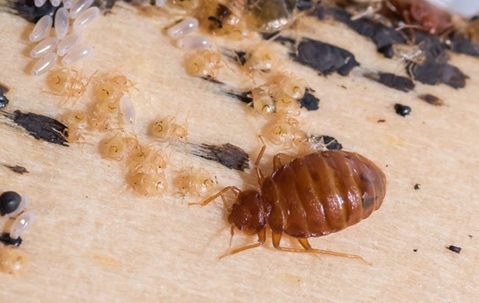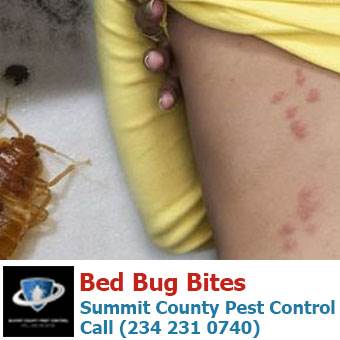Bed Bug Exterminator Houston Treatment: Specialized Methods for Removal
Bed Bug Exterminator Houston Treatment: Specialized Methods for Removal
Blog Article
Efficient Pest Control Steps to Shield Your Garden and Plants
In the realm of gardening, the consistency of a well-tended yard can typically be interrupted by unwanted pests that endanger the health and vitality of plants. As gardeners make every effort to preserve a growing outside area, the challenge of parasite control emerges as a vital facet of their horticultural ventures. Applying efficient bug control gauges not only safeguards the yard's aesthetic allure but likewise plays a pivotal role in protecting the plants' health. By exploring a variety of approaches that include all-natural repellents, beneficial bugs, buddy planting, DIY services, and environmentally-friendly chemicals, garden enthusiasts can navigate the detailed globe of parasite administration with accuracy and care.
All-natural Pest Repellents

An additional reliable all-natural bug repellent is diatomaceous earth, a grainy compound made from fossilized water organisms. Diatomaceous earth jobs by literally hurting insects with its abrasive appearance, making it an outstanding option for controlling pests like slugs, beetles, and caterpillars. Additionally, growing friend plants like marigolds, lavender, or basil can assist push back bugs due to their solid aromas or natural chemical compounds.
Beneficial Pest for Parasite Control

An additional advantageous pest is the parasitical wasp, which lays its eggs inside insect insects, eventually eliminating them. Ground beetles are outstanding for regulating caterpillars, snails, and slugs. Hoverflies, frequently mistaken for bees because of their similar appearance, feed on aphids, thrips, and caterpillars.
To bring in valuable bugs to your garden, you can plant a diverse series of blooming plants, such as dill, fennel, and yarrow, which offer nectar and pollen for adult pests. In addition, stay clear of making use of broad-spectrum chemicals that can harm both unsafe and helpful insects. By producing an inviting setting for these advantageous bugs, you can reduce the demand for chemical pesticides and advertise a much healthier, much more well balanced garden ecological community.
Friend Planting Strategies
When aiming to boost the effectiveness of useful bugs in your yard for all-natural parasite control, thinking about companion planting strategies can even more optimize the community equilibrium. Friend growing entails purposefully positioning particular plants next to each other to maximize their mutual benefits, such as hindering parasites, bring in useful bugs, or boosting nutrient uptake - bed bug exterminator houston near me. One preferred instance is growing marigolds along with tomatoes to push back nematodes and various other dangerous bugs while likewise drawing in pollinators
Additionally, incorporating fragrant natural herbs like basil, mint, or rosemary in between veggie rows can assist prevent insects with their strong aromas. An additional efficient method is planting flowers such as sunflowers, zinnias, or universes to draw in pollinators like bees and butterflies, which in turn can aid in pollinating your vegetables and fruit plants. In addition, planting trap crops like nasturtiums can draw away bugs away from your major crops, functioning as sacrificial plants that protect your beneficial produce. By implementing friend planting techniques, you can create a diverse and harmonious yard environment that normally regulates parasites while promoting plant health and wellness and performance.
Do It Yourself Insect Control Solutions
To effectively manage parasites in your garden, carrying out diy pest control options can be an economical and environmentally friendly strategy. One common DIY insect control option is creating homemade insecticidal soaps by mixing mild soap with water to manage soft-bodied insects like aphids, mites, and whiteflies. Furthermore, introducing useful pests such as ladybugs, lacewings, and predatory wasps can aid normally control pest populations in your garden. Establishing physical barriers like row covers or netting can additionally avoid insects like caterpillars from harming your plants. check out here
Companion growing particular natural herbs and blossoms like marigolds, basil, and lavender can assist push back insects and attract valuable bugs. By integrating these DIY parasite control services right into your gardening regimen, you can secure your garden and plants without counting on extreme chemicals.
Environmentally-Friendly Pesticides

Another effective option is diatomaceous planet, a natural substance made from fossilized marine microorganisms, which can be sprinkled around plants to control slugs, snails, and various other crawling insects. Additionally, insecticidal soaps and oils acquired from plant-based resources serve for controlling soft-bodied pests like aphids, termites, and whiteflies.
Final Thought
To conclude, effective parasite control procedures such as natural repellents, useful insects, friend planting techniques, do it yourself remedies, and environmentally-friendly chemicals are vital for safeguarding your yard and plants. By carrying out these methods, you can protect against damages triggered by pests and keep a healthy and growing garden ecosystem. It is necessary to take into consideration the long-term influence web of using chemicals and select even more sustainable and environmentally friendly options click this link to ensure the wellness and health of your plants and the setting.
Report this page